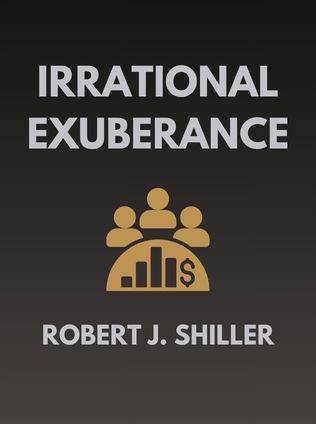
Irrational Exuberance
By Robert J. Shiller
Published 03/2000
About the Author
Robert J. Shiller, a Nobel laureate in Economics, is a prominent figure in the world of finance. His work spans across multiple domains of economics, including behavioral finance, macroeconomics, and real estate economics. Shiller’s insights have often served as a beacon for understanding the complexities of economic behavior, particularly the irrational tendencies that drive financial markets. He is perhaps best known for his role in identifying and analyzing speculative bubbles, a subject that he delves into with great depth in his book, "Irrational Exuberance."
Shiller's academic journey began with a Ph.D. in Economics from MIT, after which he joined Yale University as a professor, where he continues to educate future economists. His contributions to economics are not only theoretical but also practical, having co-developed the Case-Shiller Home Price Index, a tool that has become a standard measure in the housing market. Shiller's ability to distill complex economic concepts into accessible language has made his books, such as "Irrational Exuberance," invaluable resources for both professionals and the general public.
Main Idea
"Irrational Exuberance" is a profound exploration of the speculative bubbles that pervade financial markets, and the structural, cultural, and psychological factors that fuel them. Shiller argues that the belief in efficient markets is often misplaced, as financial markets are frequently driven by unwarranted optimism rather than rational economic fundamentals. The book dissects various bubbles, including those in the stock market, housing market, and bond market, providing a comprehensive analysis of how these bubbles form, grow, and eventually burst.
Shiller’s central thesis is that financial markets are inherently unstable due to the irrational behavior of investors, which is amplified by structural and cultural forces. He contends that this irrational exuberance leads to the overvaluation of assets, resulting in bubbles that inevitably burst, causing significant economic disruptions. The book not only examines past bubbles but also offers insights into how future bubbles might be anticipated and mitigated.
Table of Contents
- Introduction
- Speculative Bubbles in Investing Markets
- Speculation in the US Stock Market
- Speculation in the US Housing Market
- Speculation in the US Bond Market
- The Role of Media in Fueling Speculative Bubbles
- New-Era Thinking and Its Impact on Market Sentiment
- Psychological Anchors and Their Influence on Market Behavior
- Mitigating Speculative Bubbles: Strategies for Investors and Leaders
- Conclusion
Introduction
In the introduction of "Irrational Exuberance," Shiller sets the stage by challenging the efficient market hypothesis, which suggests that financial markets always perfectly reflect all available information. He posits that this belief is flawed because it overlooks the psychological and cultural factors that influence investor behavior. Shiller emphasizes that markets are not always rational; instead, they are prone to bouts of speculation driven by human emotions such as fear and greed. These emotions, when amplified by media coverage and societal narratives, can lead to the formation of bubbles—periods when asset prices inflate beyond their intrinsic value.
Speculative Bubbles in Investing Markets
Speculative bubbles, as defined by Shiller, occur when the price of an asset is driven to unsustainable levels by investor enthusiasm, rather than by underlying economic fundamentals. These bubbles are characterized by rapid price increases followed by dramatic declines, often leading to widespread economic turmoil. Shiller argues that these bubbles are a recurring feature in financial markets, driven by a combination of structural, cultural, and psychological factors.
Sign up for FREE and get access to 1,400+ books summaries.
You May Also Like
The Subtle Art of Not Giving a F*ck
A Counterintuitive Approach to Living a Good Life
By Mark MansonRich Dad Poor Dad
What the Rich Teach Their Kids About Money - That the Poor and Middle Class Do Not!
By Robert T. KiyosakiHow To Win Friends and Influence People
The All-Time Classic Manual Of People Skills
By Dale CarnegieFreakonomics
A Rogue Economist Explores the Hidden Side of Everything
By Steven D. Levitt and Stephen J. DubnerQuiet: The Power of Introverts
The Power of Introverts in a World That Can't Stop Talking
By Susan Cain



















